Related Research Articles

There have been many cases of sexual abuse of children by priests, nuns, and other members of religious life in the Catholic Church. In the late 20th and early 21st centuries, the cases have involved many allegations, investigations, trials, convictions, acknowledgement and apologies by Church authorities, and revelations about decades of instances of abuse and attempts by Church officials to cover them up. The abused include mostly boys but also girls, some as young as three years old, with the majority between the ages of 11 and 14. Criminal cases for the most part do not cover sexual harassment of adults. The accusations of abuse and cover-ups began to receive public attention during the late 1980s. Many of these cases allege decades of abuse, frequently made by adults or older youths years after the abuse occurred. Cases have also been brought against members of the Catholic hierarchy who covered up sex abuse allegations and moved abusive priests to other parishes, where abuse continued.
The ChineseCatholic Patriotic Association (CCPA) is the national organization for Catholicism in China. It was established in 1957 after a group of Chinese Catholics met in Beijing with officials from the Chinese Communist Party (CCP) and the Religious Affairs Bureau. It is the main organizational body of Catholics in China officially sanctioned by the Chinese government.

Joseph Zen Ze-kiun, SDB is a retired Chinese cardinal of the Catholic Church who served as Bishop of Hong Kong from 2002 to 2009. He was made a cardinal by Pope Benedict XVI in 2006 and has been outspoken on issues regarding human rights, political freedom, and religious liberty.

Ignatius Kung Pin-Mei was the Catholic Bishop of Shanghai, China, from 1950 until his death in 2000. He spent 30 years in Chinese prisons for defying attempts by China's Communist government to control Catholics in the country through the government-approved Catholic Patriotic Association. At the time of his death he was the oldest member of the College of Cardinals.
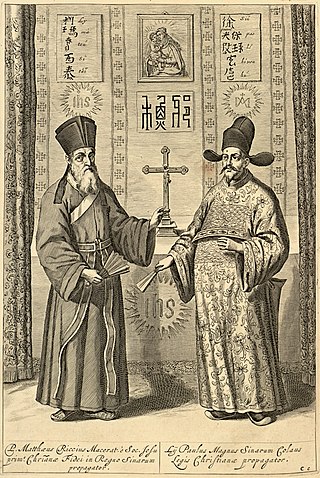
The Catholic Church first appeared in China upon the arrival of John of Montecorvino in China proper during the Yuan dynasty; he was the first Catholic missionary in the country, and would become the first bishop of Khanbaliq (1271–1368).
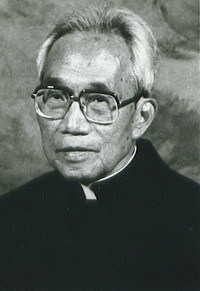
Dominic Tang Yee-ming was a Chinese Jesuit priest. Appointed Bishop in 1951 and later archbishop of Canton, he spent twenty-two years in jail for his loyalty to the Catholic Church and died in exile in the United States.

The Diocese of Shanghai is a Roman Catholic diocese in the municipality of Shanghai, China.
The Cardinal Kung Foundation is a not-for-profit Catholic organization based in Stamford, Connecticut. Founded in 1994 by Joseph Kung, nephew of the late Cardinal Ignatius Kung Pin-Mei, the foundation monitors the treatment of Catholics in China and that portion of the Catholic Church in China that remains loyal to the Pope. The foundation's primarily tool is to supply news reports to news agencies about various activities in China and has been instrumental in protecting and aiding many notable Catholics in China.
John Han Dingxiang was an underground Roman Catholic bishop of Yongnian, a division of Hebei province, in China. Han was detained for much of his ministry for his loyalty to the Vatican as opposed to the Chinese government-controlled Roman Catholic Church.

John Tong Hon is a prelate of the Catholic Church from Hong Kong. A cardinal since 2012, he was auxiliary bishop of Hong Kong from 1996 to 2008, then coadjutor bishop of the diocese for a year, and Bishop of Hong Kong from 2009 to 2017. In January 2019, he became the apostolic administrator of the diocese, in a caretaker role, after the death of his successor, Michael Yeung.
Significant doctrinal and diplomatic developments involving the Holy See and Chinese Catholics occurred during the Papacy of Pius XII (1939-1958). The Vatican recognized Chinese rites in 1939, elevated the first Chinese cardinal in 1946, and established a Chinese hierarchy.
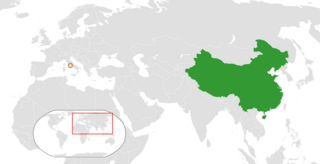
There are no official bilateral relations between the People's Republic of China (PRC) and the Holy See. The Holy See instead recognizes the Republic of China (Taiwan) as the representative of China ever since the establishment of relations with the ROC government in 1942.
Bishop Peter Joseph Fan Xueyan was a Chinese Roman Catholic priest and bishop who lived in China during the 20th century. He was bishop of the Roman Catholic diocese of Baoding.
James Lin Xili was a Chinese underground Roman Catholic bishop of Wenzhou. His 1992 ordination as the First Bishop of Wenzhou was never recognized by the government of the People's Republic of China.
Christianity is a minority in Hebei province of China. According to Asia Harvest, estimates from 2020 suggest that of the entire population (77,188,054) about 5.66% is Christian (4,367,917), among which Catholics accounted for 55.25% (2,413,541).
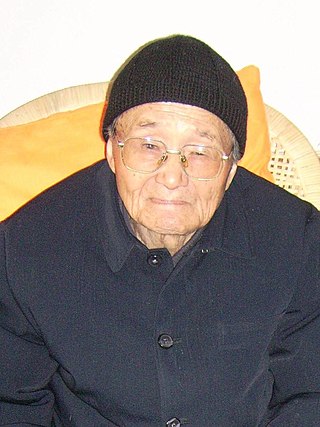
Joseph Fan Zhongliang S.J., also known as Josephus Vei Zong Leong, was a Chinese Roman Catholic bishop in the Diocese of Shanghai in China.
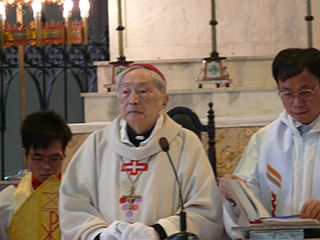
Aloysius Jin Luxian, SJ was a Chinese Catholic prelate who served as Bishop of Shanghai.
Political theology in China refers to the religious beliefs and principles that motivate the politics of China. For two millennia, China was organized on a Confucian understanding of religion and politics, often discussed in terms of Confucian political philosophy. At various points throughout its history, Chinese Buddhism presented an alternative to the political import of Confucianism. However, since the mid-twentieth century, communist understandings of religion have dominated the discourse.
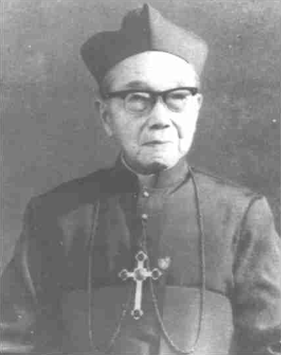
Louis Zhang Jiashu was a Chinese Jesuit priest. A founding member of the Chinese Catholic Patriotic Association (CCPA) in 1957, Zhang was elected and consecrated as the Bishop of Shanghai in 1960 without Vatican approval. He then suffered persecution during the Cultural Revolution, but resumed his position after the movement and became a political figure in his final years.
Anthony Zhang Gangyi was a Chinese Franciscan priest from Shaanxi. During World War II, he was a chaplain of a prison in Fascist Italy, where he assisted the escape of prisoners. He was later imprisoned by the People's Republic of China from 1959 to 1979, and again in 1989. He hosted the first conference of China's underground bishops.
References
- ↑ "Bishop Julius Jia Zhiguo (Kia Zhi Cuo, Jia Shoushen)". Catholic-Hierarchy.org . David M. Cheney. Retrieved 30 January 2025.
- ↑ "Elderly Catholic bishop arrested in China". Archived from the original on 2012-02-20. Retrieved 2009-03-31.
- ↑ China arrests underground bishop in move to block Vatican plan [ permanent dead link ]
- ↑ "当局圣母升天节前再软禁贾治国主教 欲关闭其残疾孤儿院". ADHRRF. 4 September 2020. Retrieved 31 July 2022.